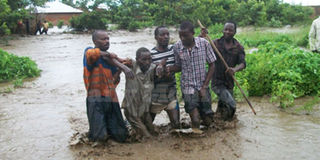We need climate change response strategies

Several countries in the world, including Uganda have focused more energies on fighting Covid-19 and ended up undermining other wanting global concerns like climate change. PHOTO/FILE
What you need to know:
- Anna Amumpire says: It is important that efforts geared towards economic recovery must go hand in hand with climate change response strategies like disaster risk management and preparedness.
The world is experiencing dual crises: Covid-19 and climate change. Both crises have led to significant loss of lives, extremely affected vulnerable and disadvantaged individuals, and pushed some health-care systems to the maximum.
It is reported that in July 2020, floods that struck Nepal exposed communities to diseases like diarrhoea, hepatitis A and E, cholera, and malaria. In the same year, storms hit Fiji and facilitated the spread of similar diseases including those associated with crowding like Covid-19.
Just like other countries, Uganda is currently experiencing the second wave of the Covid-19 pandemic that continues to threaten lives and exacerbate other drivers of vulnerability in the country. Uganda is also highly vulnerable to climate change and variability. Last year amidst the Covid-19 pandemic, Daily Monitor reported that floods in Kasese District left over 1,000 people homeless, properties destroyed and over 100 households displaced.
This was due to three rivers: Nyamwamba, Mubuku, and Nyamugasani that burst their banks leading to floods. This year in mid-July, NTV and other media outlets reported that River Nyamwamba had burst its banks again leaving hundreds homeless and even more vulnerable to Covid-19 exposure due to crowding in emergency temporary shelters.
In Uganda, climate change has led to: Increased food insecurity; the spread of diseases like malaria; soil erosion and land degradation; flood damage to infrastructure and settlements as well as shifts in the productivity of agricultural and natural resources. Just like climate change, Covid-19 has greatly affected our economy and weakened the adaptive capacities of communities.
According to the Economic Commission for Africa, the outbreak will wipe out at least 30 million jobs on the continent further adding strain to already underfunded efforts to achieve the Sustainable Development Goals among which includes climate change action. Likewise, climate change is one of the major threats to achieving Uganda’s Sustainable Development Goals and efforts to end poverty.
Furthermore, climate change impacts like droughts affect clean water access which in turn limits personal and household hygiene thereby facilitating the spread of Covid-19. Similarly, climate change impacts like floods lead to increased health related concerns by exposing the communities to diseases like meningitis, malaria and cholera yet the health centres, especially at the district level are already under pressure.
There is limited space for the increasing number of Covid-19 patients. Additionally, the Covid-19 pandemic may further strain livelihoods and resources already affected by climate change. Like climate change, Covid-19 will affect the poorer and the vulnerable people most. This calls for the need to invest in climate resilient health systems so that our health systems are prepared for both calamities.
It is predicted that Covid-19 will remain a part of our future akin to climate change. Therefore, as the country continues to respond to and address Covid-19, it is important that efforts geared towards economic recovery must go hand in hand with climate change response strategies like disaster risk management and preparedness. The alignment of responses to both crises will guarantee that both crises are effectively addressed. This will also ensure the reduction of risks while building resilient institutions that can respond to known and unknown shocks.
Anna Amumpiire Akandwanaho, Advocates Coalition for Development and Environment




